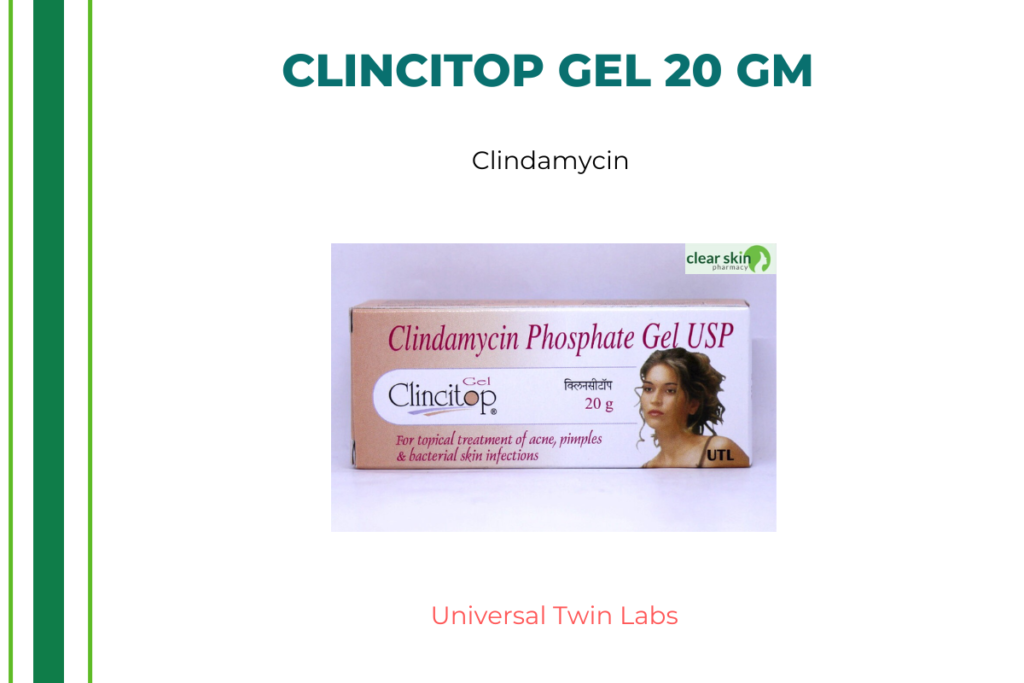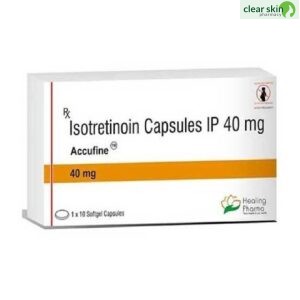Clincitop Gel 20 gm
Clincitop Gel 20 gm is a lincosamide antibiotic used to treat bacterial skin infections, such as acne (pimples), as well as infections of the abdomen, bones, skin, heart, and soft tissues. When pathogenic bacteria form within the body and cause disease, this is referred to as a bacterial infection. It may rapidly infect and proliferate in any place of the body. Viruses such as the common cold and influenza are resistant to Clincitop Gel 20 g.
Clincitop Gel 20 g includes ‘Clindamycin,’ which inhibits bacterial protein synthesis to restrict bacterial growth. It has a bacteriostatic effect, which prevents the multiplication of bacteria but does not kill them. Clincitop Gel 20 gm effectively treats infections caused by sensitive strains of Staphylococcus aureus, Streptococcus pneumoniae, and Clostridium perfringens, as well as gram-positive and anaerobic bacteria (those that do not require oxygen to thrive). Clincitop Gel 20 g is used to treat severe infections caused by sensitive anaerobic bacteria in the abdomen, gastrointestinal tract, lower respiratory tract, skin, and genitourinary tract.
There are oral, topical, injectable, and intramuscular formulations of 20 g of Clincitop Gel. Clincitop Gel 20 g is available for oral use in capsule and powder form. With or without meals, the tablet should be taken with a full glass of water. It must not be eaten, fractured, or crushed. Clincitop Gel 20 g is available as a gel, a cream, and a lotion. In both intravenous and intramuscular forms, 20 g of Clincitop Gel is injected into the body using a syringe. Similar to other medications, Clincitop Gel 20 gm has side effects, although not everyone experiences them. Common Clincitop Gel 20 gm side effects include stomach discomfort, nausea, vomiting, diarrhea, heartburn, joint pain/swelling, dark urine, and abnormal liver function tests.
Inform your doctor if you are allergic to Clincitop Gel 20 g or any of its ingredients. Inform your physician if you have liver disease, renal illness, gastrointestinal disease (colitis, an inflammation of the colon), or allergic diseases (asthma, hay fever, eczema). Clincitop Gel 20 gm should not be used during vaccinations with live bacterial vaccines (typhoid vaccine), as it may interfere with the effectiveness of the vaccine. Clincitop Gel 20 gm injection may include benzyl alcohol as a preservative, which might cross the placenta in pregnant women and cause gasping syndrome (multi-organ failure) in infants. Therefore, Clincitop Gel 20 gm should only be taken during pregnancy and breastfeeding on a doctor’s guidance. Sometimes, antibiotic treatments might result in antibiotic resistance. In such cases, your physician may prescribe you antibiotics to which you are not allergic.
Clincitop Gel 20 g is used to treat skin infections and acne caused by bacteria.

Medicinal Advantages
Clincitop Gel 20 gm is an antibiotic that can be used to treat bacterial skin infections such as acne (pimples), as well as infections of the belly, bone, skin, heart, and soft tissues. It works by stopping bacteria from making proteins, which stops them from growing. It has a bacteriostatic action, which means it prevents germs from reproducing but not killing them. Clincitop Gel 20 gm efficiently cures infections caused by gram-positive and anaerobic bacteria (those that do not require oxygen to survive), such as sensitive types of Staphylococcus aureuClincitop Gel 20 gm is an antibiotic used to treat bacterial skin infections, such as acne (pimples), as well as infections of the abdomen, bones, skin, heart, and soft tissues. It prevents bacteria from producing proteins, hence preventing their growth. It has a bacteriostatic effect, which inhibits the reproduction of microorganisms but does not kill them. Clincitop Gel 20 gm effectively treats infections caused by sensitive strains of Staphylococcus aureus, Streptococcus pneumoniae, and Clostridium perfringens, as well as gram-positive and anaerobic bacteria (those that do not require oxygen to thrive). Clincitop Gel 20 g is used to treat severe infections caused by sensitive anaerobic bacteria in the abdomen, gastrointestinal tract, lower respiratory tract, skin, and genitourinary tract.s, Streptococcus pneumoniae, and Clostridium perfringens. Clincitop Gel 20 gm is used to treat serious infections in the abdomen, gastrointestinal system, lower respiratory tract, skin, and genitourinary area caused by sensitive anaerobic bacteria.
Use Instructions
There are oral, topical, injectable, and intramuscular formulations of 20 g of Clincitop Gel. Clincitop Gel 20 g is available for oral use in capsule and powder form. Capsule: Swallow the capsule whole with a glass of water, with or without meal. It must not be eaten, fractured, or crushed. Clincitop Gel 20 g is available in gel, cream, and lotion forms. Cream/Gel/Lotion: With clean, dry hands, apply the appropriate amount of gel/lotion/cream to the afflicted areas of skin. With your fingertips, rub the medication into the skin gently. Wash your hands before and after using Clincitop Gel 20 mg. Do not cover the affected areas with a bandage or dressing. Clincitop Gel 20 gm IV injection: Clincitop Gel 20 gm IV injection is administered intravenously. Clincitop Gel 20 gm IM injection: Clincitop Gel 20 gm IM injection is administered intramuscularly (IM). To learn how to administer the injections, see your physician or pharmacist. Do not eat the medication if it seems cloudy, changes color, or includes particles.
Place in a cool, dry area out of direct sunlight.
Clincitop Gel 20 gm Side Effects
As with any other medication, Clincitop Gel 20 gm can cause stomach discomfort, nausea, vomiting, diarrhoea, heartburn, joint pain/swelling, dark urine, and abnormal liver function tests. The majority of side effects associated with Clincitop Gel 20 g do not require medical attention and diminish with time. Contact your physician if these adverse effects persist. Long-term use of Clincitop Gel 20 gm may cause oral thrush or a new vaginal yeast infection. Seek medical attention if you have fever, lymph node enlargement, rash, itching or swelling of the face, tongue, or throat, disorientation, or difficulty breathing.
Precautions and Warnings in Depth
Drug Recommendations
If you are allergic to Clindamycin or any of its components, you should not use this medication. Inform your physician if you have liver disease, renal illness, gastrointestinal disease (colitis, an inflammation of the colon), or allergic diseases (asthma, hay fever, eczema). Clindamycin should not be used during vaccinations with live bacterial vaccines (typhoid vaccine), since it may diminish the vaccine’s efficacy. Injections of clindamycin may contain the preservative benzyl alcohol, which may pass the placenta in pregnant women and cause gasping syndrome (multiple organ failure) in infants. Clindamycin should not be administered to a nursing mother since it can enter breast milk and cause diarrhea, candidiasis (thrush, diaper rash), and, in rare instances, blood in the stool. Clindamycin is therefore contraindicated during pregnancy and breastfeeding unless prescribed by a physician. Sometimes, antibiotic treatments might result in antibiotic resistance. In such cases, your physician may prescribe you antibiotics to which you are not allergic.
Interactions Between Drugs
Clindamycin may interact with antibiotics (erythromycin), anticoagulants (warfarin, acenocoumarol, and fluindione), and neuromuscular blocking medications.
If you refrain from consuming alcohol, clindamycin’s side effects may be mitigated.
Before using Clindamycin, inform your physician if you have liver or renal illness, gastrointestinal disease (colitis, an inflammation of the colon), or any allergies (asthma, hay fever, eczema).
Safety Suggestions
ALCOHOL
Alcohol should not be used while taking Clindamycin, since it may worsen the side effects.
PREGNANCY
Clindamycin injections may include the preservative benzyl alcohol, which can cross the placenta in pregnant women and cause gasping syndrome (multi-organ failure) in infants. Before using Clindamycin if you are pregnant or want to become pregnant, consult with your physician.
BREAST FEEDING
Clindamycin should not be administered to a nursing mother since it can enter breast milk and cause diarrhea, candidiasis (thrush, diaper rash), and, in rare instances, blood in the stool. It is suggested that breastfeeding mothers take a different medicine. Before taking Clindamycin if you’re nursing, see your doctor.
DRIVING
As a possible adverse effect of Clindamycin, you may experience vertigo. In such situations, desist from driving or using heavy machinery until you have fully recovered.
Inform your doctor if you have a history of liver disease, as Clindamycin may provoke jaundice and abnormal liver function tests.
KIDNEY
Before using Clindamycin, if you have a history of renal illness, you should inform your doctor.
No habit formation
Advice on Diet and Lifestyle
Use gentle soap and a warm bath when taking a bath.
On your skin, you should avoid harsh products.
To prevent infecting the afflicted area, refrain from scratching or picking at it.
Manage your stress, eat correctly, drink enough water, engage in regular exercise, and get sufficient rest.
To prevent bacterial infections, you should avoid going barefoot in places such as gym showers.
Caffeine and alcohol use should be avoided or limited.
Recommendations
Patients with severe liver disease require monitoring of liver function (liver function tests).
Clindamycin should be administered alongside a routine blood profile.
Since clindamycin might cause Clostridium difficile-associated diarrhea (CDAD), it is prudent to have your intestines examined often.
When Clindamycin is used with anticoagulants, coagulation tests are recommended.
Clindamycin usage has been associated with mild to life-threatening Pseudomembranous colitis. Therefore, it is essential to investigate this diagnosis in patients who develop diarrhea after taking Clindamycin.
Additional Information : This item is non-refundable.
Glossary of Diseases and Conditions
A bacterial infection occurs when pathogenic bacteria proliferate within the body and cause disease. It may infect and proliferate exceedingly rapidly in any place of the body. It is possible to categorize bacteria as spherical, rod-shaped, or spiral-shaped. Gram-positive and gram-negative bacteria are distinguished by the thickness of their cell walls (do not have a cell wall). The most common symptoms of a bacterial infection are cough, fever, and fatigue. Acne is a skin disorder caused by the clogging of hair follicles by excess oil and dead skin cells. Possible adverse effects include whiteheads, blackheads, and pimples.
FAQs
Clindamycin is an antibiotic used to treat skin infections caused by bacteria. It prevents bacteria from producing proteins, hence preventing their growth.
You should take Clindamycin with caution and seek medical advice if you have liver disease, renal disease, gastrointestinal disease (colitis, an inflammation of the colon), or allergic diseases (asthma, hay fever, eczema).
Even if you feel better, continue taking Clindamycin for as long as your doctor prescribes. Your symptoms may improve before the condition is completely cured.
Clindamycin can diminish the effectiveness of live vaccines, such as typhoid vaccine. Consult your doctor before beginning Clindamycin if you are receiving any vaccines.
Abnormal liver function tests are among the side consequences of clindamycin. Consult a physician before to using Clindamycin if you have a history of liver issues.







Be the first to review “CLINCITOP 1% GEL 20 GM 1 tube”